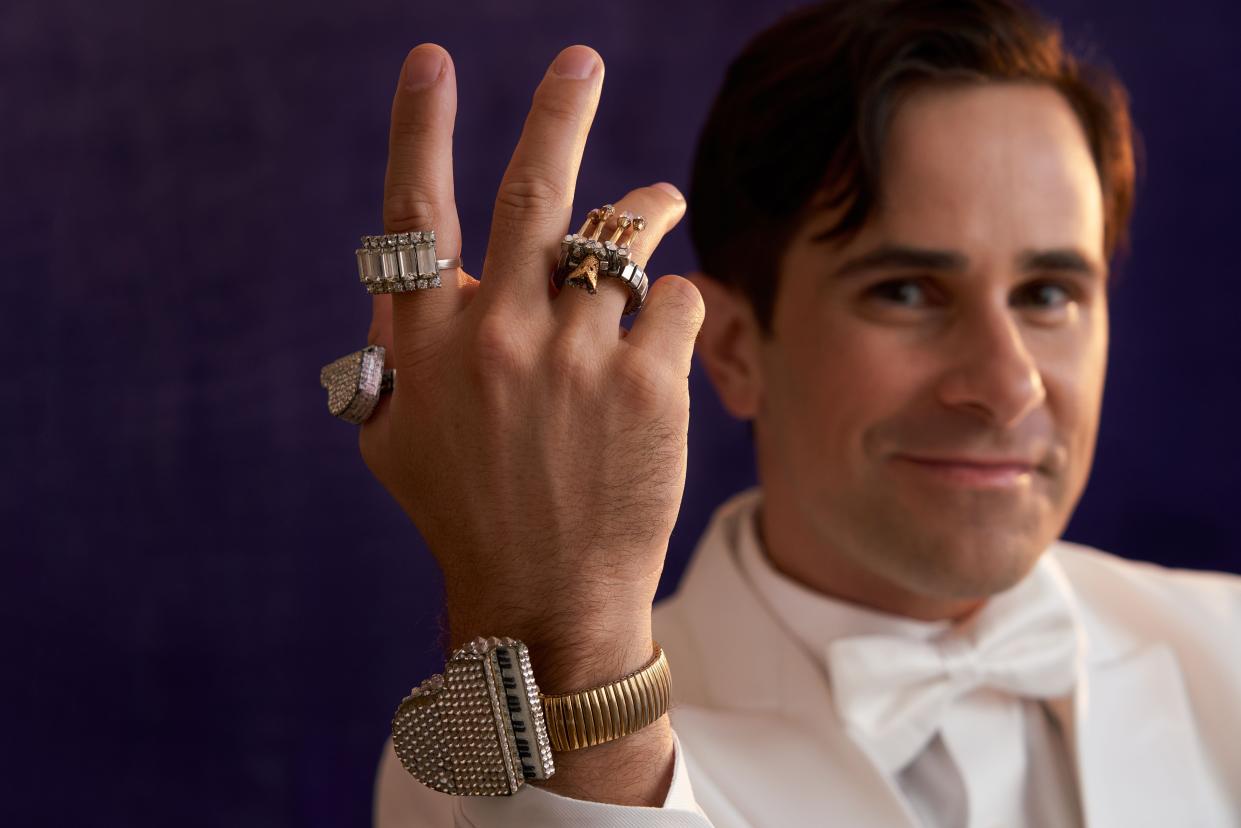Milwaukee native Brett Ryback may have been destined to play 'Liberace!'

No performer on a Milwaukee stage this season has a heavier lift than Brett Ryback.
In Milwaukee Chamber Theatre's new production of the solo show "Liberace!," Ryback not only speaks as the flamboyant entertainer, he also plays all the piano — more than 30 individual pieces, from "Three Little Fishies" to Chopin and Liszt. Performances begin Nov. 17.
"I haven't been this terrified to take something on in a while," Ryback said. "I think that's a good reason to accept a challenge."
Nervous he may be. But Ryback comes to the role with a background so tailor-made, it seems like he was destined to wear the sequined cape.
Born in Milwaukee, Ryback spent his earliest years in a neighborhood south of National Avenue, not far from where Liberace grew up decades earlier.
Now an actor, pianist and composer, Ryback's boyhood piano teacher was Jack Forbes Wilson, who played the title character of "Liberace!" in the first two productions of Brent Hazelton's play at the Milwaukee Repertory Theater in 2010 and 2014.
Wilson "was a wonderful piano teacher because he really let me play what I wanted to play, and then he would sort of slip in some vegetables," Ryback said, referring to the classical pieces that his teacher had him work on.
You might think a young pianist growing up in Liberace's neighborhood would have heard the star's name often. But Ryback was a teenager before he had any notion of who Liberace was.
There's "a lack of Milwaukee pride in him," Ryback said.
Liberace's arc, from Milwaukee to Las Vegas
Born Wladziu (Walter) Valentino Liberace in 1919 in West Allis and raised in West Milwaukee, the young piano prodigy met the famous Ignacy Paderewski and later played a Liszt piano concerto with the Chicago Symphony Orchestra in 1940 at Milwaukee's Pabst Theater. Not long afterward, Liberace remade himself into a showbiz star who combined flashy musicianship with glitzy costumes and staging.
In the '50s, he was one of the world's most popular touring entertainers. When that career slumped, he became a signature Las Vegas act. He also hosted and guested on TV shows, and performed in movies (with a notable turn as a casket salesman in "The Loved One").
Liberace fought public attempts to call him gay during his lifetime. Such a label would not only have hurt his career, it might also have subjected him to physical danger. While whispers about his homosexuality had followed him for years, he won a famous 1956 libel suit against a British newspaper columnist who had described the performer, among many other pejoratives, as "fruit-flavored." But a 1982 palimony suit by former boyfriend Scott Thorson and Liberace's 1987 death from complications related to AIDS made it impossible to deny who he was.
Unbound by time, the Liberace in Hazelton's script is open about his preference, even making several jokes about the subject. Hazelton created the show in collaboration with the Liberace Foundation for the Performing and Creative Arts.
A self-made American entertainer
When people remember Liberace today, they think of his costumes and his Vegas act with dancers, musicians and animals, Ryback said.
But they don't always remember him as the child of an immigrant father, growing up poor during the Great Depression, Ryback said, calling Liberace a quintessentially American self-made entertainer.
"He loved making money and was really good at it," Ryback said.
Liberace was also "unavoidably queer," Ryback noted. "Perhaps that's why we don't always give him the due that he deserves."
Hazelton's script explores the tensions between the persona that Liberace presented to the world and what he felt inside — both in his sexuality and in his approach to the music he played.
In response to a question, Ryback said he thought a more open life might have been possible for Liberace in the 1970s and '80s with the rise of the gay liberation movement. Still, "I really don't ever feel the need to pity him," Ryback said.
"As a queer man living today, I love my predecessors," Ryback said. "I find heroism, especially in what he was able to accomplish given the limitations. He was not someone who could fully pass, as we say, and yet he still was a massive success because of his innate creativity, and his innate courage and boldness."
How good a pianist was Liberace?
"He was an incredible technician," Ryback said. His respect for Liberace's playing grew as he watched videos of the star at the keys. In fact, Ryback had to stop watching those videos because he found Liberace's technique intimidating, he said with a laugh.
"I don't know how his fingers move so quickly," he said.
Ryback says he does understand criticism leveled by some that Liberace was not a particularly emotional musician.
"I'm far more of an emotional player than I am a technician," Ryback said. "I can't try to play exactly like him. I have to find my own way into it."
The most challenging piece Ryback had to learn for the show was Liszt's “Liebesträume." It "was a mountain," Ryback said. But now it's "absolutely one of my favorite pieces in the thing."
If you go
Milwaukee Chamber Theatre performs "Liberace!" Nov. 17 through Dec. 10 at the Broadway Theatre Center, 158 N. Broadway. For tickets, visit milwaukeechambertheatre.org or call (414) 291-7800.
More: Richard Thomas embraces the challenge of being Atticus Finch in 'To Kill a Mockingbird'
This article originally appeared on Milwaukee Journal Sentinel: Milwaukee roots connect Brett Ryback to man he portrays in 'Liberace!'

